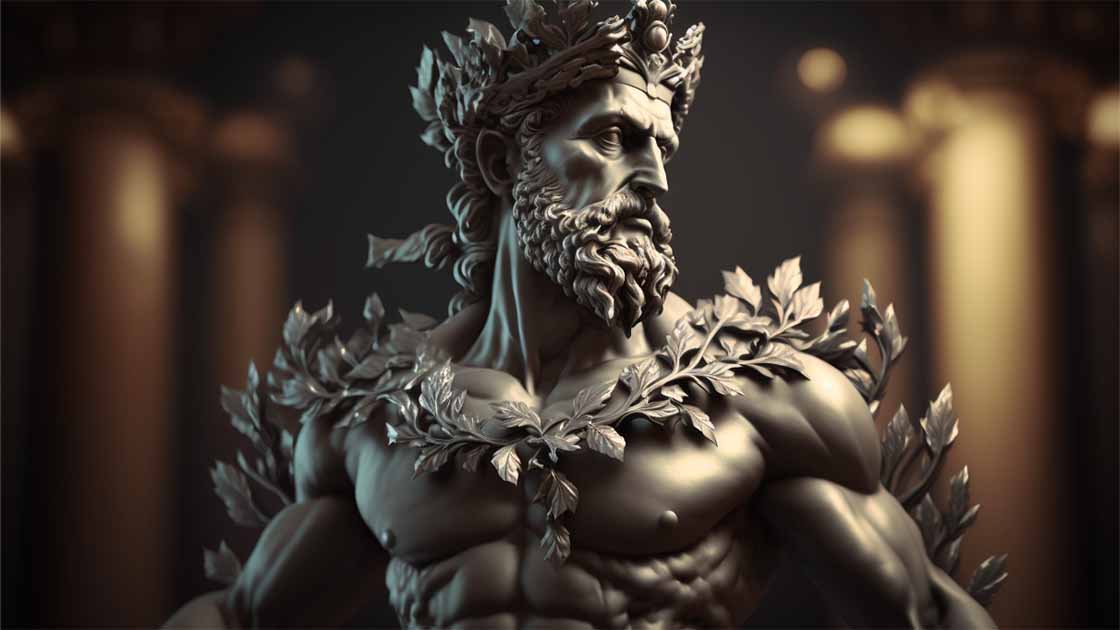Dionysus, the Mysterious Greek God of Wine and Ecstasy
In the realm of ancient gods and goddesses, few held such an esteemed place in history as Dionysus. This vibrant and multifaceted deity of ancient Greek mythology embodies the essence of wine, ecstasy, theater, and revelry. He is the god of ecstatic dance, the patron of the insane, and the unavoidable aspect of ancient parties and drunken orgies. His rich history, cult practices, and symbolic significance have left an indelible mark on the cultural and religious landscape of antiquity. Who was this god who was so different to the stark and serious gods of the Greek pantheon?
Raise a Glass of Wine in the Name of Dionysus
Dionysus's origin story is steeped in mythological drama. He is traditionally regarded as the son of Zeus, the king of the gods, and Semele, a mortal princess. However, Semele's tragic fate is woven into the narrative. Hera, Zeus's wife, envious and suspicious, manipulated Semele into demanding Zeus reveal himself in his divine glory. The overwhelming sight consumed Semele in flames, but to save the unborn Dionysus, Zeus sewed the premature infant into his thigh until the time of his birth.

A nurse prepares to deliver Dionysus from the thigh of Zeus on the lid of a Roman sarcophagus depicting the triumphal procession of Dionysus through India with his attendants riding elephants and lions 190 AD. (Mary Harrsch/CC BY-NC-SA 2.0)
Other ancient origin stories of this god tell us that he was a Thracian, and then traveled the world before at last arriving in Greece as a foreigner, staying there. In several such accounts he is always dubbed a “foreigner”, which could suggest that the cult of this god was originally not Greek, but borrowed and accepted from one of the neighboring civilizations, likely the Thracians.

The precursor Greek Dionysia festivals gave way to the later festivals of Bacchus. (Public Domain)
But over time, the worship of Dionysus became deeply rooted in ancient Greek culture, particularly during the classical and Hellenistic periods. The Dionysian cult, marked by its ecstatic and liberating rituals, held a significant place in religious practices. The most renowned festival dedicated to Dionysus was the Dionysia, celebrated in various Greek city-states. These festivals included a lot of revelry drinking, in particular of wine, which was thought to inspire “divine madness”, bring joy, and ease one’s sufferings. Another key part of these festivals was the performance of dramas, enacting many myths surrounding Dionysus. This was the precursor to the modern drama theater.
- "I am the Lord God Dionysus": Parallels between Yahweh and Dionysus
- Greek Gods: The 7 Core Males Exposed
The God of Ecstasy and Drunkenness
Central to the worship of Dionysus were the Dionysian mysteries - secretive and initiatory rites conducted in various locations, including Athens and Eleusis. Participation in these mysteries was a transformative experience, promising a deeper understanding of the divine and the mysteries of existence. Initiates engaged in rituals involving dance, music, and the consumption of wine, symbolizing communion with the god. The secrecy surrounding the mysteries added an air of mystique to the worship of Dionysus, fostering a sense of exclusivity and shared spiritual knowledge among the initiated.
Dionysus's symbolism extends beyond his association with wine and revelry. He embodies the dualities of life, representing both the joyous celebration of existence and the darker, more chaotic aspects of human nature. His thyrsus, a staff crowned with a pinecone, serves as a symbol of fertility and transformation. The parallels between Dionysus and other mythological figures are also noteworthy. In the Roman pantheon, Dionysus found an equivalent in Bacchus, the god of wine and revelry. Additionally, the Egyptian god Osiris shares similarities with Dionysus, particularly in their associations with resurrection and the cycles of life.

Portrait of the statue of Dionysus Bacchus. (Ruslan Gilmanshin / Adobe Stock)
The influence of this god extends far beyond the realm of mythology. His presence is palpable in the arts, particularly in ancient Greek theater. The plays performed during the Dionysia explored the complexities of the human experience, often delving into the divine and the inexplicable, echoing the themes inherent in the worship of Dionysus. Pottery from the ancient Greek world frequently features scenes from plays performed during the Dionysia. These depictions provide insights into the costumes, masks, and theatrical conventions of the time.
- Ancient Greek Theater and the Monumental Amphitheaters in Honor of Dionysus
- The Great Mountain Citadel of Perperikon and the Dionysian Cult
Ecstasy, Mysteries, and Portals to New Dimensions
Artistic representations of Dionysus abound in ancient Greek and Roman art. In sculpture, he is often depicted as a youthful figure, adorned with a wreath of ivy or grape leaves. The Dionysian procession, known as the "Thyrsus bearers," was a popular motif, showcasing worshippers carrying the thyrsus and engaging in ecstatic dance. In literature, on the other hand, authors have drawn inspiration from Dionysus to explore themes of liberation, rebellion, and the pursuit of a more profound understanding of existence. His archetype can be identified in characters who challenge societal norms and embrace the uninhibited aspects of human nature. His connection with ecstasy and ritual madness allow for the exploration of more taboo themes and imaginative realms.

Dionysus riding a panther, mosaic floor in the 'House of Dionysus' at Pella. (Late 4th century BC) Pella Archaeological Museum (Fingalo/ CC BY-SA 2.0)
Even after many centuries, Dionysus stands as a multifaceted and enduring figure whose influence transcends the boundaries of ancient Greek mythology. From the ecstatic rituals of his cult to the thought-provoking plays of Dionysia, Dionysus has left an indelible mark on the cultural, artistic, and philosophical landscape, inviting contemplation of the complexities inherent in the human condition.
Top image: AI representation of Greek God Dionysus. Source:Vlad/Adobe Stock
References
Grimal, P. 1996. The Dictionary of Classical Mythology. Wiley-Blackwell.
Otto, W. F. 1965. Dionysus: Myth and Cult. Indiana University Press.
Powell, B. B. 2015. Classical Myth. Pearson.

















